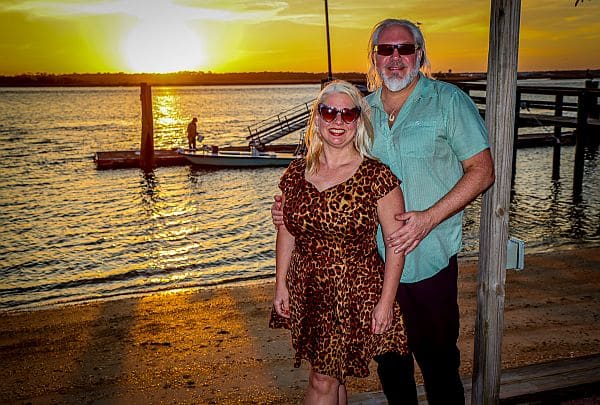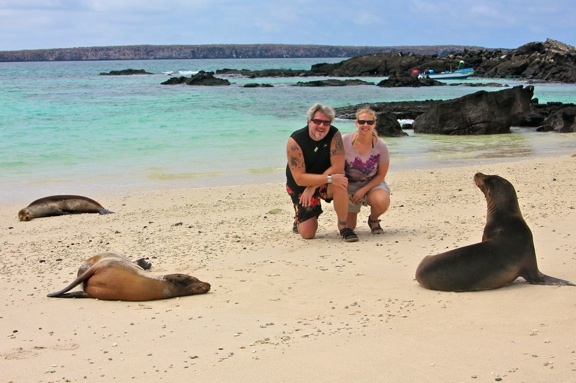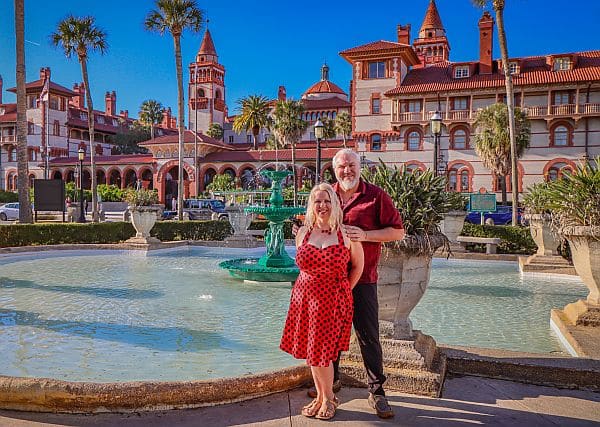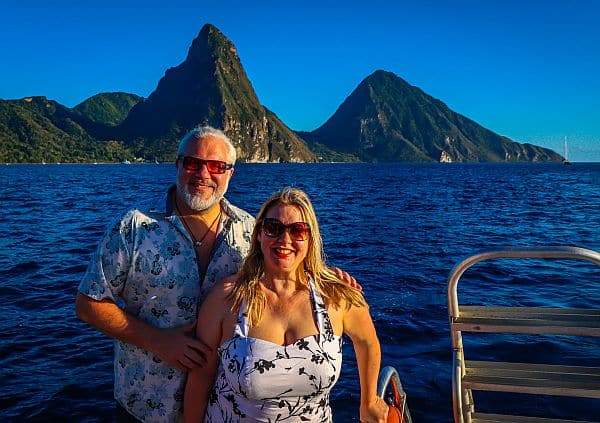An Interview with Bret Love, Travel Publisher
 Bret Love, together with his partner, Mary Gabbett, started Green Global Travel after realizing that there was a place on the internet for his passions for ecotourism and nature/wildlife conservation. A few years ago they added a regional site focused on a nearby area and called it Blue Ridge Mountains Travel Guide. I caught up with Bret to post a new and updated interview that spans his whole career and gets into the present.
Bret Love, together with his partner, Mary Gabbett, started Green Global Travel after realizing that there was a place on the internet for his passions for ecotourism and nature/wildlife conservation. A few years ago they added a regional site focused on a nearby area and called it Blue Ridge Mountains Travel Guide. I caught up with Bret to post a new and updated interview that spans his whole career and gets into the present.
How did you get started in the travel writing industry?
The very first international trip I did as a travel writer was in 1997. I had worked as a freelancer and eventually got a staff job. At the time I was the managing editor of a national network of publications called Insight Magazine and they were focused on young adults at colleges. They mostly focused on entertainment but since I was the managing editor I had a lot of leeway. I hadn’t traveled much outside the USA so I went on a press trip to Costa Rica and I think that was where I heard about ecotourism for the first time and really got into the concept. We were exploring parts of Costa Rica that most people don’t go to.
Then the year after that, I did a trip to Alaska. After that I did a big safari trip to South Africa and that’s where I really kind of learned about the connection between ecotourism conservation and how tourism can be a power for changing things environmentally and preserving natural space.
I had a daughter in 2001 though and didn’t travel internationally for a few years. But from that point on, I really wanted to focus on that specific type of travel in my work as a writer. By around 2006 I was starting to transition into doing more like airline and hotel magazines. At one point I had written articles in 15 airline magazines all around the world, plus I was getting work from magazines for St. Regis Hotels and Marriott. They weren’t giving me a ton of opportunities to write about ecotourism specifically, but there were ecotourism elements that I was able to work in.

Once I met Mary in 2008, she had experience with running small businesses and working with visionary entrepreneurs. I wanted to sort of take control because by 2008 I started to see which way the print publication industry was going. Where freelance writing work was going to go into decline. The assignments were getting fewer, the budgets were getting smaller, they wanted 300 word stories instead of 1600 word stories, blah, blah, blah.
The three of us went to Costa Rica in 2010 trip, when my daughter was 9. We went there for 10 days and we went to Tortuguero National Park and some other very remote areas. That’s where we came up with the idea for what became Green Global Travel, a site that would focus exclusively on ecotourism. So I have Costa Rica to thanks twice: it kicked off travel writing in general and my first blog.
Then you also spent years doing content marketing work for travel tour companies. How did you land that opportunity?
We got our first press trip invite for Green Global Travel specifically to cruise around the Galapagos Islands with a small company called EcoVentura, a great match for us.
The ship only carries 20 passengers and crew, very eco focused, as their name implies, and we went on that trip and filmed it with this small video camera before GoPros called a Flip Camera. We got some great footage from it and I just sold a few seconds clip from that to a TV show based in Malaysia.
We started publishing video that was unique and around 2010 or 2011, the World Wildlife Fund reached out to us and asked if they could share some of those videos on their website. And we told them, “Of course, no problem.” We didn’t ask for any money. Some people say you should always charge for your stuff but it was the World Wildlife Fund and believed in the organization.

They used four videos and they promoted us actively. And within a matter of three months, we probably had over a dozen different tour operators wanting us to come and travel with them and cover their eco trips. One of those was a company that was based in Alabama called International Expeditions. In 2012, we went with them to the Peruvian Amazon. We wrote kind of a day by day diary of the trip, just like most bloggers did back in those days. Lot of photos, decent number of videos and they liked what we did enough that the following year they asked us if they could use a little bit of our video footage because they were pitching a show to the Travel Channel.
Again we said, “Sure, no problem!” We didn’t charge them. We looked at it as a partnership, like it would come back to us somehow. From Atlanta we knew the woman who ran marketing and had been there a long time. In 2014 she reached out and she said, “We’re about to renew our content marketing contract with this company that’s based in Alabama. They were Alabama’s number one advertising agency several years in a row and the tour company had been using them for all of their blogging content for years.
She said, “I think you guys would do a better job and get us better results because they’re really doing just the bare minimum. Not only did she encourage us to submit an RFP response for this contract, but she told us exactly what the advertising agency was charging and what they were delivering.
In three weeks we created what became Green Travel Media, which was an alliance of travel bloggers who were involved with responsible tourism. We built an LLC. We built a website. We answered the RFP in detail. We got the contract and we became their content marketing agency of of choice.
Then we parlayed that into a contract with another similar company called Discover Corps and then the following year, another company that I was associated with called Zegram Expeditions hired us. So at one point we had three different tour operators that were using us to provide anywhere from 5 to 10 stories per month. These were articles for their corporate blogs to help promote tours and it was really the same kind of content we were already doing for our own blog anyway.
We got paid well to do all of their content marketing from 2014 to 2019. That was a huge part of our focus so Green Global Travel was really almost a side gig. We weren’t focused on making money from that because we were making so much money from these corporate clients. And by that point I had completely stopped freelancing. My last freelance gig was 2015, for the National Geographic website. I stopped contributing right after they got bought by Rupert Murchoch’s company.
I want to circle back to something you mentioned before about how some very vocal writers say you shouldn’t give away anything for free or do work that isn’t directly paid. I’ve always felt that was short-term thinking and I can chalk up a lot of my success to being generous and getting paybacks much later. It sounds like that approach has served you well too, right?
When I first got into the blogging field, one of the first things that really surprised me was a how few resources there were out there for how to treat blogging as a business. There were groups for travel bloggers where newbies would ask questions and they would just get shut down. They would get made fun of. I really thought in the greater interest of the industry that we needed a place where we experienced people could interact with these bloggers, people who really did want to make it a business. And approach it from a business standpoint.
So that’s when we started the Business of Blogging Facebook group and we made it a policy that you could not make fun of anybody. You cannot be an A-hole to anybody. There was no intent to make money from that, it was and is just for communication.
Going further back, when I was in school I was originally studying to be in the music industry, but I also studied entrepreneurship because I had this idea that I was going to own my own record label. I was going to own my own recording studio. Or something like that.
One of the key things I learned was an economic theory called “opportunity cost” and that means whatever choice you make there are not only the positive aspects of making that particular choice, but there are the negative aspects of “what if?” What if I do this instead of that other option? What do I lose? What do I gain? And it measures every decision including the opportunity cost.
What are the positives and negatives if I do something completely different? So for me, just saying “You should never work for free” is ignoring the opportunity cost of, “If I did work for free, how could this benefit me long-term? What opportunities are missed if I don’t do it?”

With that Green Travel Media business, over the span of five years we made more than a quarter million dollars. From just saying yes to that one company who wanted to use our videos to try to get a deal with the Travel Channel. I guarantee you if we had turned them down, that relationship would never have grown in the way that it did. It didn’t cost me to give away something for free. It paid me exponentially more than I ever could have made from any media outlet by selling footage.
If you do good things then good things come to you. And sure, there’s a time to be a jerk about it. There’s a time to be selfish. There’s a time to refuse to work for free, but there are also opportunities that present us with pathways that did not exist to us beforehand. Whether or not these pathways lead to the place that we anticipate they will, there is sound business sense. What I lose by offering somebody something for free? This company that we just sold footage to paid us $300 for 10 seconds. It’s not a lot of money.
And take speaking at a conference like TBEX where you don’t get paid. Not in cash, but there are opportunities that come out of that in terms of visibility and networking. Every choice you make in business, whether you’re a travel writer or any other kind of business person, the opportunity cost is really what you have to understand before you make those decisions.
Some people won’t go on a press trip if it’s not paid, but we’ve never loved the business model of a client paying me to write a certain number of stories about their business because then everything becomes sponsored. Your brand doesn’t really have any sense of true integrity. You’re just going to the highest bidder.

Where are Things With Green Global Travel Now?
Like a lot of blogs, we got hit by the Google updates in 2019, a precursor to the hammering a lot of people took in this most recent one. That update knocked us down by about half and we never got back to that level. Now we average between 100,000 to 125,000 views in an average month. It’s flat but steady.
But this right after that, Covid-19 hit and nobody was traveling internationally. So we put our efforts into a domestic regional site. We have only done two international trips in the last four years for myriad reasons, but primarily because we’ve been focusing on growing our Blue Ridge Travel Guide site and it’s bringing in more revenue. It’s essentially passive income because we’re only adding stories sporadically at this point.
So tell us about the transition to the Blue Ridge Mountains site and what are some of the advantages of running a regional site as opposed to your international one?
We started it for several different reasons, personal and professional from. It was very difficult to monetize Green Global Travel in any way other than advertising. And even advertising-wise, we never got the RPMS that other types of sites were able to get because we were so niche focused or ecotourism. And I just wasn’t willing to sacrifice the dedication to the niche for more money.
The second thing was my daughter graduated high school in 2019 and we knew we were going to be empty nesters. My lifelong dream had been to live on the lake. I’d grown up spending summers on a lake with my grandparents and have always wanted to have some sort of a small lake house. So we got this idea of moving to the mountains because the weather is cooler than in Atlanta where we live. There’s a lot of water. The Blue Ridge Mountains start about 30 minutes north of our house. We decided, well, if we’re going to look for a place to live, what better way to do it than to write about all of these towns in Georgia and North Carolina and Virginia and Tennessee, all of which are a few hours drive from our house? We can explore these towns, write about them, share the info with other people, and then we can write off the cost.
Third and finally, I also learned that my family has been in the Blue Ridge Mountains for over 250 years and some of my ancestors were among the earliest settlers of this region. Some have towns named after them.
And of course we knew that with COVID we could still do domestic travel. We never got on a plane. We drove everywhere. We would do these huge road trips and go from town to town to town and it was just kind of a way to sort of take the concept of green global travel and say, how does this apply to our region? What is the local culture? What are the local companies that are doing tourism the right way? Which are the local restaurants that are doing the farm to table thing? The only difference was that the Blue Ridge site has more monetizable content. We write about hotels, we write about cabin rentals, we write about restaurants, we write about tours.
How many income streams do you think you have these days and what are the main ones?
Mediavine is number 1 by far, although not as far as it used to be. After all these recent Google updates, we lost about 60% of our monthly revenue from that.
Off the top of my head, affiliate revenue is probably #2. Next would be direct ads and sponsored content for blog posts, newsletters, or social. Then we have an eBay business that’s kind of a separate business selling old collectibles and that’s probably #4.
Then selling photography and selling video footage. That’s been a very small part, but we’re actually about to launch a new ancillary photography business that is probably going to be a mixture of doing portraits in nature and selling nature photography by us and by some of our photographer friends who live in the Blue Ridge region.
What advice would you give to someone that wants to start out right now with a new blog?
My advice would be to not start a travel blog at all. Not right now anyway.
I would go into something that is a little less subject to the whims of Google and the other entities that are trying to push bloggers out. I would say to focus on developing multiple revenue streams right from the get go. We’ve always been very careful about not putting all our eggs in one basket and we’ve always been big into diversification of revenue streams. But now even more so than ever before we are practicing that.
We’re about to start launching a book series. We’re talking about doing tours in conjunction with the photography business where we take people on winery tours and then we photograph them with their friends and family.
I would personally be scared to start a new blog until we get a sense for what AI is going to do to the entire blogging industry and our industry. I would look at what’s going to come out as being the most immune to SERP changes. This is a time to hold tight and see how things play out before we move forward.
___
As a full-time professional writer/editor/photographer since 1995, Bret Love has covered travel and culture for 100+ publications, including American Way, Destination Marriott, National Geographic, Rolling Stone, Southbound, and Yahoo Travel. In 2010, he and his photographer/videographer wife, Mary Gabbett, co-founded the award-winning ecotourism website, Green Global Travel, which has been ranked among the world’s top travel blogs. They also co-founded Green Travel Media, a content marketing agency that manages corporate blogs for various tour operators.
The couple has spoken and led blogging/travel writing workshops at conferences all around the world, including Canada Media Marketplace, the NY Times Travel Show, the Society of American Travel Writers, and TBEX, where they have been featured as keynote speakers twice. Since launching their Blue Ridge Mountains Travel Guide site in 2020, they have visited 50+ Blue Ridge Mountain towns together, with plans to release their first book in 2024.
Interview conducted in April, 2024 by Travel Writing 2.0 author and editor Tim Leffel.


So sad that they don’t believe in differing opinions, or free speech. Look at their page. They say that if your opinion differs from theirs, stay away.
Then it’s not meant for you.
What a bizarre response. If this man Bret says he doesn’t believe in differing opinions or free speech, then he’s not much of an American and even less of a journalist. Neither are you for simply shrugging it off as “it’s not meant for you.” It’s good that A.I. is going to ruin your careers, I suppose.
Niche websites are not meant to appeal to the masses. Or to those who are easily offended. If you want a generic travel website that takes pains to never exclude anyone, go read USA Today or a AAA magazine. If you want to read an opinionated blog run by two individuals who care deeply about the environment and stewardship of nature, read the one we’re talking about. If you don’t like what you see there, it’s not meant for you so you should move on and get your free information from those AI tools. Since they’re not human and are just stealing from the most generic articles that others have already written, you don’t have to worry about any pesky opinions.